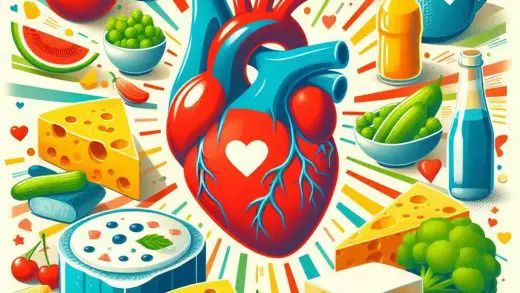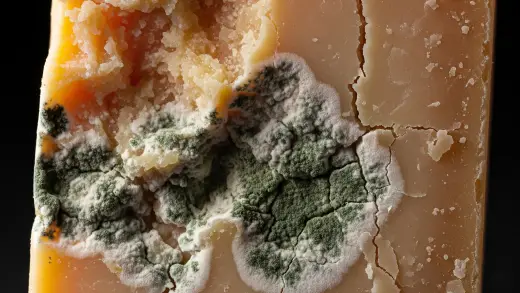You can generally enjoy burrata during pregnancy, as long as it’s made with pasteurized milk.
Here’s why that little detail is a big deal:
The Pasteurization Lowdown
The main thing we worry about with soft cheeses like burrata when you’re pregnant is a bacteria called Listeria.
If you get a Listeria infection (listeriosis) while pregnant, it can be really serious for both you and your baby, sometimes leading to miscarriage or other severe issues.
But here’s the good part: pasteurization is a heating process that zaps those harmful bacteria, including Listeria, in milk.
Most burrata you find in stores, especially in places like the US, is made with pasteurized milk.

What to Look For
So, how can you be sure? Always, always check the label! It should clearly say “made with pasteurized milk.”
If you’re getting burrata from a smaller, local shop or a farmers’ market and you can’t confirm it’s pasteurized, it’s really best to skip it to be on the safe side.
Also, remember to keep your burrata happy in the fridge. Make sure it stays at or below 40°F (4°C) and don’t leave it sitting out at room temperature for more than two hours.
In short, if your burrata proudly states it’s made with pasteurized milk and you keep it chilled, go ahead and enjoy that creamy deliciousness! If you’re ever unsure, it’s always smart to play it safe or chat with your doctor.
The Crucial Role of Pasteurization: Why It Matters for Pregnant Women
When you’re pregnant, every bite you take feels like it carries extra weight, and for good reason! One of the unsung heroes in keeping food safe, especially dairy, is a process called pasteurization. Let’s break down why it’s so important.
What is Pasteurization?
Simply put, pasteurization is like giving milk (or other liquids) a quick, hot bath. It involves heating the milk to a specific temperature for a set amount of time and then quickly cooling it down. This isn’t about cooking the milk; it’s about making it safe.
Why it’s essential for dairy products: This quick heating process is incredibly effective at wiping out harmful bacteria that could be lurking in raw milk. Without it, dairy products would pose a much higher risk of foodborne illnesses.
The Risk: Listeria Monocytogenes
One of the most concerning bacteria that pasteurization tackles is Listeria monocytogenes.
What is Listeria? It’s a type of bacteria that can cause an infection called listeriosis.
Why it’s dangerous for pregnant women: While healthy adults might just experience mild, flu-like symptoms, Listeria can be incredibly dangerous during pregnancy.
It can cross the placenta and lead to serious complications for the baby, including miscarriage, premature labor, stillbirth, or severe illness in newborns.
How unpasteurized dairy products are a common source: Unpasteurized dairy products, often called “raw milk” products, are a well-known culprit for Listeria contamination because the bacteria aren’t killed off before consumption.
Pasteurized vs. Unpasteurized Cheese:
This is the golden rule when you’re pregnant:
- Pasteurized cheese is generally safe to eat. The pasteurization process eliminates the harmful bacteria, making these cheeses a much safer choice.
- Unpasteurized cheese is generally NOT safe to eat during pregnancy. It carries the risk of Listeria and other dangerous pathogens.
It’s good to know that most commercially produced burrata (and other soft cheeses) in countries like the United States are pasteurized.
This is largely thanks to strict food safety regulations, including those from the FDA, which require milk used for most commercial dairy products to be pasteurized. Always double-check the label to be sure!
Is Burrata Pasteurized? How to Check for Safety
When you’re pregnant and craving that creamy burrata, a common question pops up: is it safe? The good news is often yes, but there’s a crucial detail to check!
The Good News: Most Burrata Is Pasteurized
Here’s a sigh of relief for cheese lovers: the vast majority of burrata you’ll find in standard grocery stores, especially in places with strong food safety regulations like the US, is indeed made with pasteurized milk.
This is because commercial producers typically adhere to guidelines that require pasteurization to ensure product safety for a wide consumer base.
How to Confirm: Your Safety Checklist
Even with the general good news, it’s always smart to be a detective when it comes to food safety during pregnancy.
- Always check the label: This is your number one rule! Take a moment to read the packaging. You’re specifically looking for phrases like “made with pasteurized milk” or simply “pasteurized.” If it’s on the label, you’re generally in the clear.
- When to be cautious: Not all burrata is created equal, especially when it comes to its origins. Be extra cautious with:
- Artisanal cheeses: Smaller, specialty producers might use traditional methods that forgo pasteurization.
- Farmer’s market finds: While often delicious, these might come from smaller dairies that don’t pasteurize their milk.
- Homemade burrata: Unless you know exactly where the milk came from and that it was pasteurized before cheesemaking, it’s best to avoid. When in doubt, ask or avoid.
- If there’s no clear label and you can’t get a definitive answer from the seller about pasteurization, it’s safest to skip it for now.
Burrata as a Soft Cheese: Understanding the Nuance
Burrata is indeed a soft cheese, and pregnant women are often advised to avoid soft cheeses.
However, it’s important to address a common misconception: it’s not the “softness” of the cheese itself that makes it unsafe; it’s the pasteurization status that truly matters.
Soft cheeses, by their very nature, have a higher moisture content compared to hard cheeses. This higher moisture content creates a more hospitable environment for bacteria to grow if they are present.
Therefore, if a soft cheese like burrata is made with unpasteurized milk, that ideal environment for bacterial growth becomes a significant concern.
But when it’s made with pasteurized milk, those harmful bacteria have been eliminated, making it safe to enjoy.
Beyond Pasteurization: Important Food Safety Tips for Burrata (and Other Foods)
While ensuring your burrata is pasteurized is the top priority for pregnant women, food safety doesn’t stop there.
Proper handling and storage are equally crucial for burrata and, frankly, most other foods you’ll consume during pregnancy. Think of these as your golden rules for a safe and healthy eating experience.
Proper Storage: Keep it Chilled
Temperature control is your best friend when it comes to perishable foods like burrata.
- Refrigerate promptly: As soon as you bring burrata home, pop it into the refrigerator. Make sure your fridge is set to below 40°F (4°C). This cold environment significantly slows down the growth of harmful bacteria.
- Consume within a few days of opening: Once you’ve opened that delicious package of burrata, it’s best to enjoy it within a few days. The longer it sits, even in the fridge, the higher the chance of spoilage or bacterial growth.
- Never eat perishable food left at room temperature for more than two hours: This is a critical rule for any perishable food. The “danger zone” for bacterial growth is between 40°F (4°C) and 140°F (60°C).
If burrata (or any other perishable food) has been sitting out for more than two hours, it’s best to discard it to avoid potential foodborne illness.
Serving Temperature: A Little Nuance
Burrata is often celebrated for its creamy texture best enjoyed when it’s not ice-cold.
While burrata is often served at room temperature to enhance its flavor and texture, for pregnant women, it’s safest to keep it chilled until just before serving.
You can let it sit out for a short period (e.g., 15-30 minutes) right before you plan to eat it, but avoid extended periods on the counter.
Mention cooking burrata: If you’re particularly concerned or just love cooked cheese, heating burrata is an excellent way to ensure safety.
Cooking it to piping hot (over 165°F/74°C) will effectively kill any potential bacteria. Think of it in a warm pasta dish, on a hot pizza, or baked into a casserole.
General Pregnancy Food Safety Reminders: Your Daily Habits
These habits extend beyond burrata and are vital throughout your pregnancy:
Wash hands thoroughly
Always wash your hands with soap and warm water for at least 20 seconds before and after handling food, especially raw ingredients.
Keep raw and cooked foods separate
Prevent cross-contamination by using separate cutting boards, plates, and utensils for raw meats, poultry, seafood, and eggs, and for ready-to-eat foods.
Wash fruits and vegetables
Rinse all fresh produce under running water before eating, even if you plan to peel it.
Cook meats thoroughly
Use a food thermometer to ensure all meats, poultry, and fish are cooked to their safe internal temperatures. No rare or medium-rare meats during pregnancy!
By following these guidelines, you can confidently enjoy your food choices while minimizing risks during this special time.
Nutritional Benefits of Burrata (When Eaten Safely)
Once you’ve confirmed your burrata is pasteurized and you’re handling it safely, you can fully appreciate that this delicious cheese isn’t just a treat for your taste buds – it can also offer some valuable nutrients essential during pregnancy!
Burrata, like many other dairy products, can be a beneficial addition to your pregnancy diet, contributing to both your health and your baby’s development.
Let’s look at some of the key nutrients burrata can provide:
Protein
Burrata is a good source of protein, which is absolutely vital during pregnancy. Protein is the building block for all of your baby’s tissues and organs, including their brain, muscles, and bones.
It also supports the growth of maternal tissues, such as the placenta and increased blood volume.
Calcium
This is a superstar nutrient during pregnancy, and burrata delivers! Calcium is absolutely essential for your baby’s bone development and the formation of strong teeth.
Equally important, it helps maintain your own bone health, preventing your body from drawing calcium from your bones to meet your baby’s needs.
Vitamins (e.g., B12)
Burrata also provides various vitamins, including Vitamin B12. Vitamin B12 plays a crucial role in the development of your baby’s brain and nervous system, as well as in the formation of red blood cells.
In summary, when consumed safely (meaning it’s made with pasteurized milk and properly handled), dairy products like burrata can be a valuable and nutritious part of a healthy pregnancy diet.
They offer a convenient and tasty way to boost your intake of essential protein, calcium, and important vitamins, all of which contribute to a healthy pregnancy outcome.
Conclusion
Please remember: Always prioritize personalized medical advice.
Consult your healthcare provider if you have any concerns about your diet, food safety, or specific foods like burrata during pregnancy.
Crucially, contact your doctor immediately if you experience flu-like symptoms (fever, aches, nausea, vomiting, diarrhea) after eating any food.
Early intervention is vital for your health and your baby’s well-being. Your doctor is your best resource for a safe pregnancy.















